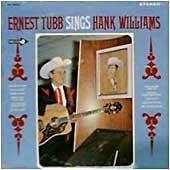| Ernest Tubb Sings Hank Williams | ||||
|---|---|---|---|---|
 | ||||
| Studio album by | ||||
| Released | March 1968 | |||
| Recorded | November–December, 1967 | |||
| Studio | Bradley's Barn, Mount Juliet, Tennessee | |||
| Genre | Country, Honky tonk | |||
| Label | Decca DL-74957 | |||
| Producer | Owen Bradley | |||
| Ernest Tubb chronology | ||||
| ||||
Ernest Tubb Sings Hank Williams is an album by American country singer Ernest Tubb, released in 1968 (see 1968 in music). It is a tribute to the songs of country singer-songwriter Hank Williams.
Contents
| Review scores | |
|---|---|
| Source | Rating |
| AllMusic | |